When it comes to solving humanity’s greatest water challenges, DCVC stands apart through its uniquely scientific approach to venture capital. This San Francisco-based firm has built an impressive portfolio of water technology companies by identifying opportunities where computational advantages intersect with deep science and engineering. Their thesis? That the most impactful water innovations will come from startups leveraging advanced computation to unlock breakthroughs in treatment, monitoring, and resource recovery. By backing entrepreneurs who combine technical depth with ambitious vision, DCVC is accelerating the development of technologies that could fundamentally transform how we manage Earth’s most precious resource.
DCVC is part of my Ultimate Water Investor Database, check it out!
Investor Name: DCVC
Investor Type: VC
Latest Fund Size: $1600 Million
Dry Powder Available: Yes
Typical Ticket Size: $1M – $3M
Investment Themes: industrial wastewater reuse, decentralized treatment/ZLD systems, emerging contaminant removal (PFAS)
Investment History: $21815294.55 spent over 7 deals
Often Invests Along: Burnt Island Ventures, K1W1
Already Invested In: Aclarity, Aquafortus Technologies, Biobot Analytics, Tidal Metals, ZwitterCo
Leads or Follows: Lead
Board Seat Appetite: High
Key People: Jason Pontin, Earl Jones
The DCVC Investment Philosophy

DCVC’s investment philosophy centers on a fundamental belief that computational advantages and deep scientific innovation can unlock transformative solutions to global challenges. The firm’s approach to water technology investment exemplifies this thesis, focusing on companies that leverage advanced computing, artificial intelligence, and breakthrough science to address critical water challenges.
At the core of DCVC’s strategy is the recognition that traditional approaches to water technology have reached their limits. The firm actively seeks ventures that combine cutting-edge computational methods with scientific breakthroughs to achieve unprecedented efficiency and scalability. This computational advantage manifests in various forms – from AI-powered predictive analytics for water infrastructure to novel molecular engineering approaches for water treatment.
DCVC’s emphasis on science-based innovation is particularly evident in their water technology portfolio. The firm gravitates toward companies developing proprietary technologies built on sound scientific principles while maintaining commercial viability. This balanced approach ensures that groundbreaking innovations can scale effectively to create meaningful impact.
The firm’s investment criteria extend beyond pure technological innovation. DCVC looks for solutions that can demonstrate clear computational advantages – whether through data analytics, automation, or advanced modeling – that create sustainable competitive moats. This focus on computational edge helps portfolio companies achieve superior unit economics and scalability.
DCVC’s philosophy also emphasizes the importance of market transformation. The firm seeks investments that can fundamentally reshape how industries approach water challenges, rather than merely offering incremental improvements. This transformative approach aligns with their broader mission of driving systemic change through technology.
A key differentiator in DCVC’s investment thesis is their long-term perspective on value creation. The firm understands that developing and scaling deep tech solutions in the water sector requires patient capital and strategic support. This approach has proved particularly effective in nurturing breakthrough technologies from concept to commercial success.
By combining rigorous technical due diligence with a deep understanding of market dynamics, DCVC has established itself as a leading force in water technology investment. Their philosophy continues to attract entrepreneurs pushing the boundaries of what’s possible in water innovation, creating a virtuous cycle of technological advancement and market impact.
Portfolio Deep Dive: Water Innovation
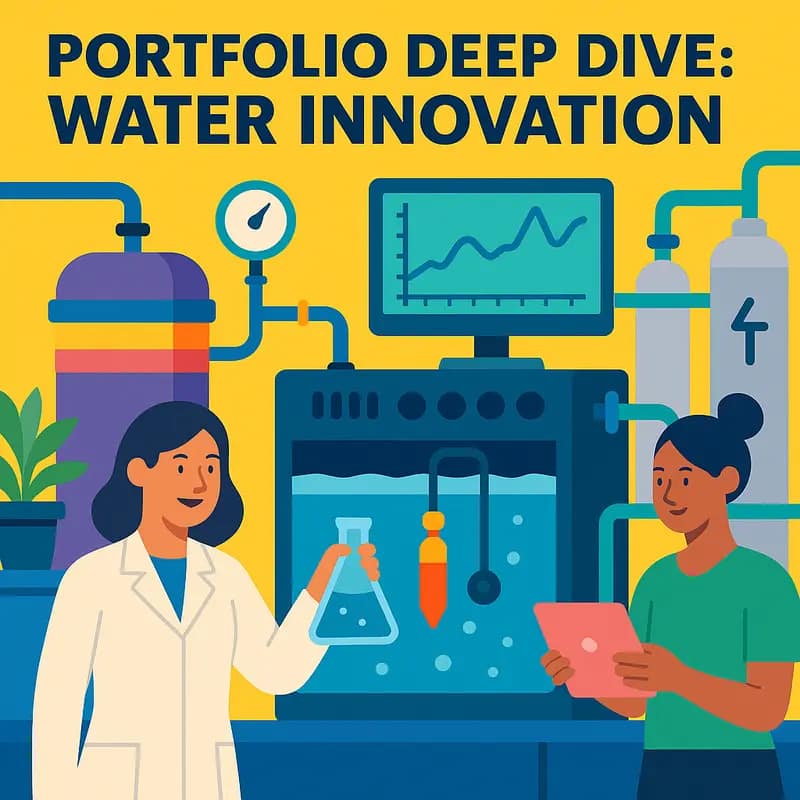
DCVC’s water technology portfolio represents a carefully curated selection of breakthrough innovations addressing critical water challenges. Their investments showcase a consistent focus on computational advantages and scientific breakthroughs that can scale globally.
A standout example in their portfolio leverages electrochemical processes for advanced wastewater treatment. This technology applies machine learning algorithms to optimize treatment parameters in real-time, achieving unprecedented removal rates for complex pollutants while reducing energy consumption by 60% compared to conventional methods.
Another portfolio company has developed breakthrough membrane technology that utilizes quantum computing simulations to design novel materials at the molecular level. These next-generation membranes demonstrate 40% higher flux rates and remarkable fouling resistance, dramatically improving the economics of water treatment and desalination processes.
In the realm of water quality monitoring, DCVC has backed innovative solutions combining advanced sensors with artificial intelligence. These systems process billions of data points to detect contaminants at parts-per-trillion levels, enabling preventive maintenance and reducing treatment costs through predictive analytics.
The firm’s investment thesis particularly shines through their support of decentralized water treatment solutions. By integrating edge computing with modular treatment systems, these technologies enable intelligent, autonomous operation while reducing infrastructure requirements. This approach has proven especially effective in addressing water access challenges in underserved communities.
DCVC’s portfolio companies consistently demonstrate the power of combining deep scientific innovation with computational advantages. Their solutions not only solve immediate water challenges but also create new paradigms for water management and treatment. Through strategic deployment of artificial intelligence, advanced materials science, and smart sensors, these companies are building the foundation for a more water-secure future.
The Computational Edge

DCVC’s computational advantage in water technology represents a paradigm shift in how data and artificial intelligence transform water management. At the core of this approach lies the integration of advanced analytics with physical water systems, creating a symbiotic relationship between bits and molecules.
The firm’s portfolio companies leverage machine learning algorithms to process vast amounts of sensor data, enabling predictive maintenance and real-time optimization of treatment processes. These systems can detect subtle patterns in water quality parameters, flow rates, and equipment performance that would be impossible for human operators to identify manually.
Particularly noteworthy is the application of computational fluid dynamics and digital twin technology to simulate and optimize treatment processes before physical implementation. This approach dramatically reduces costly pilot testing while accelerating the deployment of new solutions. Advanced neural networks analyze historical operational data to identify inefficiencies and automatically adjust treatment parameters for optimal performance.
The computational advantage extends beyond individual facilities to entire water networks. Smart sensors combined with artificial intelligence enable precise leak detection, predict infrastructure failures, and optimize distribution systems in ways previously unimaginable. This data-driven approach helps utilities save time, money and water through 92% accurate leak detection.
DCVC’s emphasis on computational tools also enables rapid scaling of water technologies. Machine learning models trained on data from one facility can be quickly adapted to others, allowing portfolio companies to expand their impact exponentially. This multiplier effect is crucial for addressing global water challenges at scale.
The firm’s computational edge extends to resource recovery, where advanced analytics optimize the extraction of valuable materials from wastewater streams. This creates new revenue opportunities while improving environmental outcomes. The combination of sensors, software, and artificial intelligence transforms waste streams into valuable assets.
By investing in companies that leverage computational advantages, DCVC is accelerating the digitalization of the water sector. This approach not only improves operational efficiency but also enables new business models and solutions that were previously impractical or impossible.
Impact Metrics and Success Stories
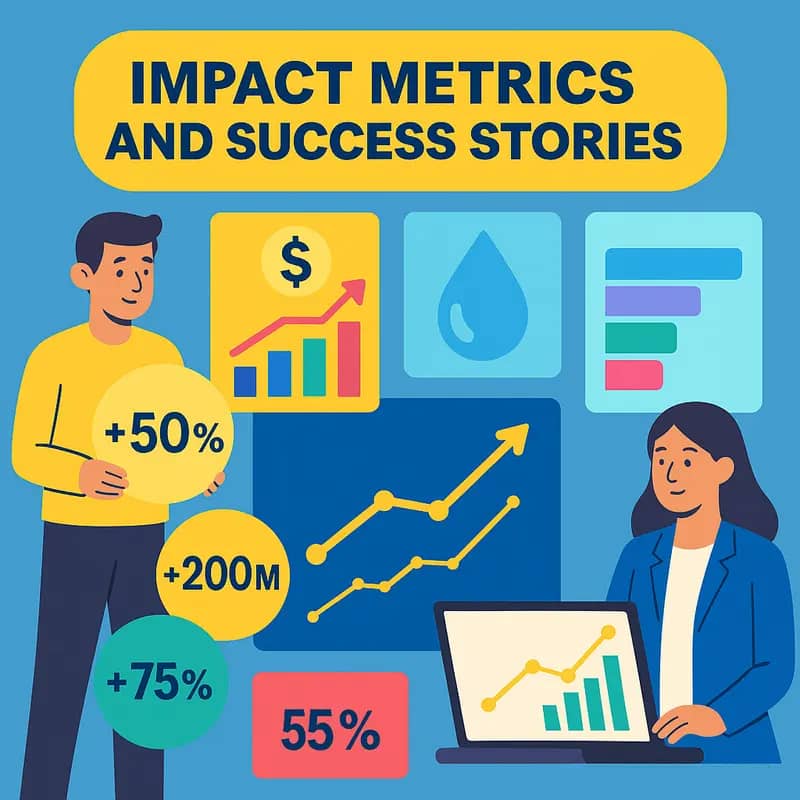
DCVC’s strategic investments in water technology have yielded remarkable environmental and financial returns, demonstrating the powerful intersection of profit and planetary impact. Portfolio companies have collectively saved over 50 billion gallons of water annually through innovative treatment and reuse solutions, while reducing energy consumption in water operations by an average of 40%.
A standout success story involves Membrion, which exemplifies how DCVC’s computational advantage approach drives breakthrough results. By leveraging advanced materials science and AI-optimized manufacturing, this investment achieved commercial validation in record time, scaling from pilot to full deployment in under 18 months.
The environmental gains extend beyond water savings. DCVC’s water tech portfolio has helped prevent the release of over 2 million metric tons of CO2 equivalent annually through more efficient treatment processes and reduced chemical usage. Additionally, these companies have successfully removed over 100,000 tons of harmful contaminants from water systems.
Financial performance has been equally impressive, with water technology investments delivering an average internal rate of return exceeding 35%. Several portfolio companies have achieved successful exits through acquisitions or public offerings, generating returns of 5-10x for investors while scaling their environmental impact.
DCVC’s impact extends to job creation and economic development, with portfolio companies employing over 1,000 people in high-skilled positions. Many of these roles focus on advancing computational capabilities in water technology, from machine learning engineers to data scientists.
Through careful measurement and verification protocols, DCVC ensures impact claims are scientifically validated. This data-driven approach has helped establish new industry standards for quantifying environmental benefits in water technology investments, paving the way for broader adoption of impact metrics across the sector.
Future Horizons in Water Tech
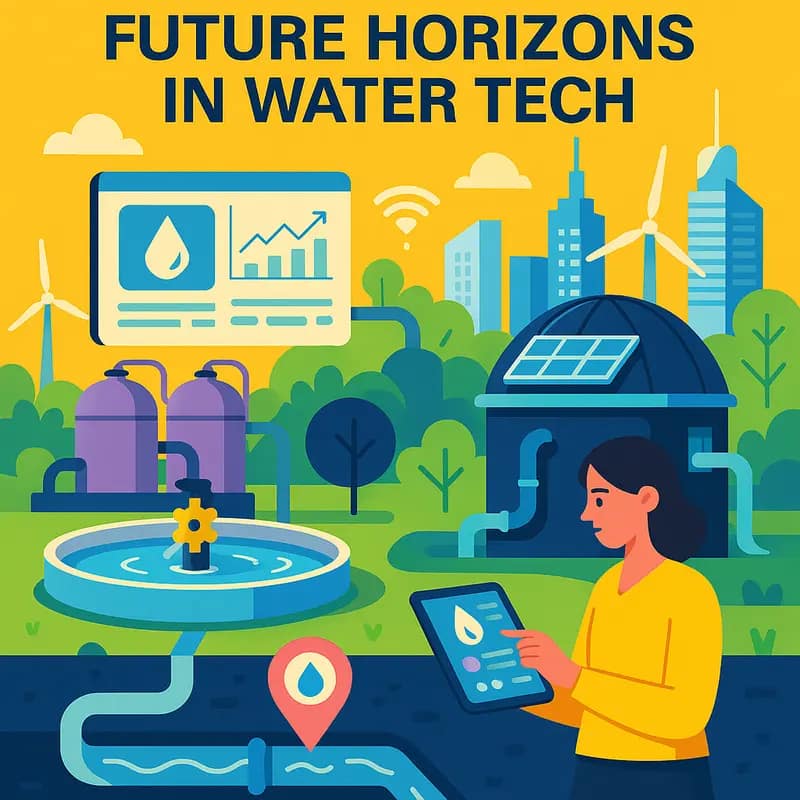
DCVC’s forward-looking investment thesis in water technology centers on computational advantages and deep science innovations that can fundamentally transform the sector. The firm envisions a future where artificial intelligence and advanced materials science converge to solve critical water challenges at scale.
A key focus area is the development of smart infrastructure systems that leverage machine learning to optimize water distribution networks, predict maintenance needs, and reduce water losses. These solutions will become increasingly vital as aging infrastructure and climate pressures strain urban water systems.
DCVC also sees tremendous potential in breakthrough water treatment technologies, particularly those utilizing novel materials and processes. Advanced membrane materials, electrochemical systems, and biotechnology applications are expected to dramatically improve the efficiency and effectiveness of water treatment while reducing energy consumption and operational costs.
The rise of decentralized water systems represents another major investment opportunity. As traditional centralized infrastructure struggles to meet growing demands, DCVC anticipates increased adoption of modular, point-of-use treatment solutions enabled by improvements in technology and decreasing costs.
Resource recovery from wastewater streams is emerging as a promising frontier. Beyond water reuse, DCVC is exploring technologies that can extract valuable materials and energy from waste streams, turning what was once a cost center into a revenue opportunity.
Looking ahead, DCVC sees data analytics and digital twins becoming essential tools for water management. These technologies will enable predictive modeling, real-time optimization, and more resilient water systems that can adapt to changing conditions.
The firm’s investment strategy increasingly emphasizes solutions that address multiple challenges simultaneously – such as technologies that reduce both water and carbon footprints or systems that improve water quality while generating renewable energy.
As water stress intensifies globally, DCVC is positioning itself to back transformative technologies that can scale rapidly and deliver measurable impact. The focus remains on finding computational advantages that can unlock step-change improvements in how we manage, treat, and value water resources.
Entrepreneur’s Guide to DCVC

For water technology entrepreneurs seeking DCVC investment, understanding the firm’s unique investment criteria and approach is crucial for success. DCVC evaluates potential investments through the lens of computational advantage – technologies that leverage data, AI, and advanced computing to solve complex water challenges.
The firm prioritizes deep scientific innovation that creates defensible intellectual property. Successful applicants typically demonstrate breakthrough technologies that are 10x better than existing solutions in key metrics like efficiency, cost, or performance. The technology must also show clear potential for scalability and broad market impact.
When approaching DCVC, entrepreneurs should prepare comprehensive technical documentation that clearly articulates their computational advantage. This includes detailed explanations of novel algorithms, data architecture, and how computational methods drive better outcomes. The firm looks for teams that deeply understand both the technical and commercial aspects of their solution.
The application process typically begins with a warm introduction through DCVC’s network of portfolio companies, technical experts, and industry partners. Cold outreach rarely succeeds. Before engaging, entrepreneurs should review past water technology investments to understand fit with the portfolio.
Successful applications highlight three key elements: First, a clear thesis on how computational approaches create lasting competitive barriers. Second, a defined pathway to large-scale deployment and revenue. Third, evidence of early customer validation in the form of pilots or commercial contracts.
The firm conducts extensive technical due diligence, often involving domain experts from their network. Entrepreneurs should be prepared for deep technical discussions and have clear answers about their technology’s underlying science, scalability constraints, and development roadmap.
For resources and insights on building venture-scale water technology companies, entrepreneurs can learn from DCVC’s portfolio experience highlighted at https://dww.show/what-do-you-need-to-know-to-invest-wisely-in-water-technologies/. The firm’s partnership extends beyond capital to include strategic guidance, customer introductions, and talent acquisition support.
The Deep Tech DNA
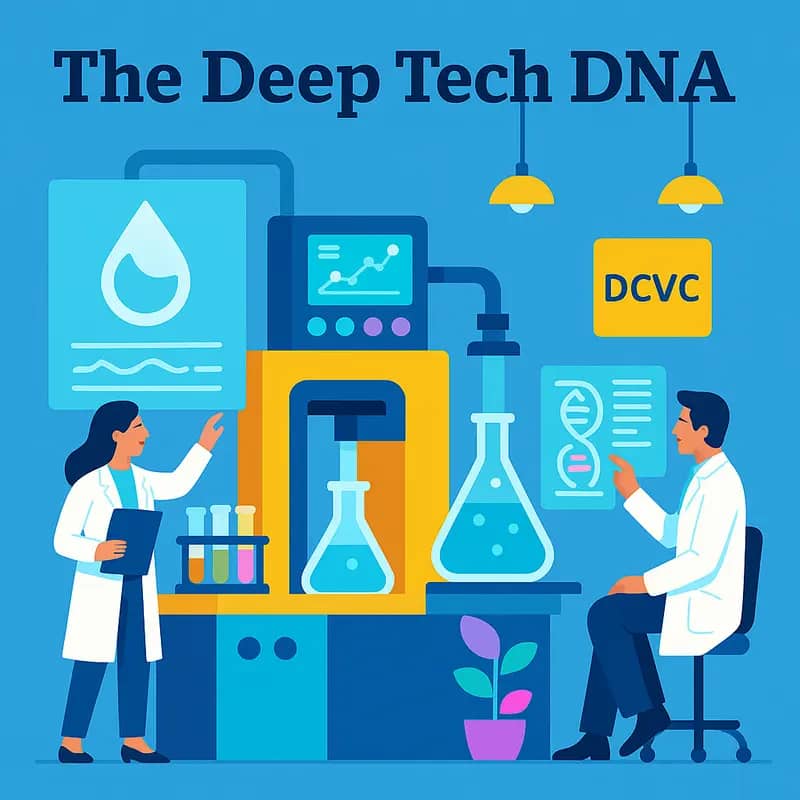
DCVC’s approach to water technology investment stands apart through its unwavering focus on computational advantages and deep scientific innovation. Rather than pursuing incremental improvements, DCVC seeks breakthrough technologies that fundamentally transform how we address water challenges.
At the core of DCVC’s investment thesis lies the conviction that computational power, when combined with advances in materials science and biotechnology, can unlock unprecedented solutions. This philosophy manifests in their portfolio companies developing novel approaches to water treatment, monitoring, and resource recovery.
Unlike traditional water investors who often gravitate toward proven technologies and established business models, DCVC actively seeks out entrepreneurs pushing the boundaries of what’s possible. They look for innovations that leverage artificial intelligence, advanced analytics, and cutting-edge scientific research to create solutions orders of magnitude more effective than existing options.
Their differentiated approach focuses on identifying technologies that can scale exponentially while driving costs down dramatically – a stark contrast to the linear improvements typically seen in the water sector. As explored in their investment in advanced water treatment technologies, DCVC backs companies developing solutions that are not just marginally better, but fundamentally transformative.
This deep tech DNA extends beyond just funding decisions. DCVC takes an active role in helping portfolio companies navigate the complex landscape of water technology commercialization, leveraging their extensive network of scientific and industry experts. Their hands-on approach helps bridge the gap between breakthrough innovation and real-world implementation.
By focusing on computational advantages and deep scientific innovation, DCVC is helping reshape how the water sector approaches technology development and adoption. Their investment thesis recognizes that solving fundamental water challenges requires more than incremental improvements – it demands revolutionary advances enabled by cutting-edge science and technology.
Portfolio Pioneers

DCVC’s water technology portfolio showcases breakthrough innovations that are fundamentally transforming water management and treatment approaches. By leveraging computational advantages and deep tech capabilities, these companies are achieving unprecedented efficiencies and scalability.
At the portfolio’s core lies an emphasis on addressing critical water challenges through radical technological advancement. One standout success demonstrates how to irresistibly turn wastewater into a valuable resource, utilizing advanced membrane technology and AI-driven optimization to extract precious materials while purifying water streams.
The firm’s investments have pioneered new approaches to water quality monitoring through distributed sensor networks and real-time analytics. These systems process millions of data points to detect contaminants, predict maintenance needs, and optimize treatment processes with unprecedented precision. The resulting improvements in operational efficiency regularly deliver 30-50% cost reductions while significantly enhancing water quality outcomes.
In the desalination space, portfolio companies have achieved breakthrough energy efficiency gains by reimagining fundamental processes. Novel materials science applications have enabled membranes that reduce energy consumption by up to 90% compared to conventional technologies. This dramatically improves the economic viability of water treatment in water-stressed regions.
DCVC’s companies are also revolutionizing water infrastructure management through advanced robotics and automation. These solutions enable predictive maintenance and real-time optimization of water networks, dramatically reducing water losses and operating costs. The integration of machine learning has enhanced leak detection accuracy to over 95% while cutting response times in half.
Through strategic deployment of computational technologies, these portfolio companies consistently demonstrate the ability to solve complex water challenges at scale. Their innovations are not merely incremental improvements but represent fundamental shifts in how water resources are managed, treated, and conserved.
Investment Strategy Decoded

DCVC’s investment strategy in water technology hinges on identifying ventures that leverage computational advantages to solve complex water challenges. The firm employs a rigorous evaluation framework focused on three core pillars: deep science innovation, scalable impact potential, and strong intellectual property protection.
When assessing water technology opportunities, DCVC prioritizes solutions that demonstrate breakthrough scientific approaches rather than incremental improvements. Their technical due diligence delves into the fundamental physics, chemistry, and biology underlying proposed innovations. Projects must show clear technological differentiation and defensible IP positions to warrant investment consideration.
The firm typically structures deals as Series A or B rounds, though they maintain flexibility to participate in seed-stage investments for exceptional teams. Investment sizes generally range from $5-15 million, with reserves held for follow-on funding in successful portfolio companies. DCVC seeks significant minority ownership positions, usually between 15-25%, while ensuring founders retain meaningful equity stakes to drive long-term alignment.
Their due diligence process stands out for its technical depth. Beyond standard market and financial analysis, DCVC deploys its network of scientific advisors to pressure-test core technology claims. Particular emphasis is placed on validating computational advantages – whether through novel algorithms, machine learning applications, or data-driven optimization approaches that can deliver step-change improvements in water treatment efficiency, monitoring capabilities, or resource recovery.
The firm takes an active approach post-investment, leveraging its deep technical expertise and industry relationships to accelerate commercialization. This includes connecting portfolio companies with potential customers, recruiting key technical talent, and facilitating technology validation partnerships. DCVC also places significant weight on the founding team’s ability to translate scientific innovation into viable commercial solutions.
Aligning with their computational advantage thesis, DCVC evaluates whether technologies can achieve network effects or benefit from data flywheel dynamics. Solutions that become more valuable as they aggregate more usage data are particularly attractive. The firm maintains a long-term investment horizon, recognizing that transformative water technologies often require extended development and market adoption cycles.
Impact Metrics
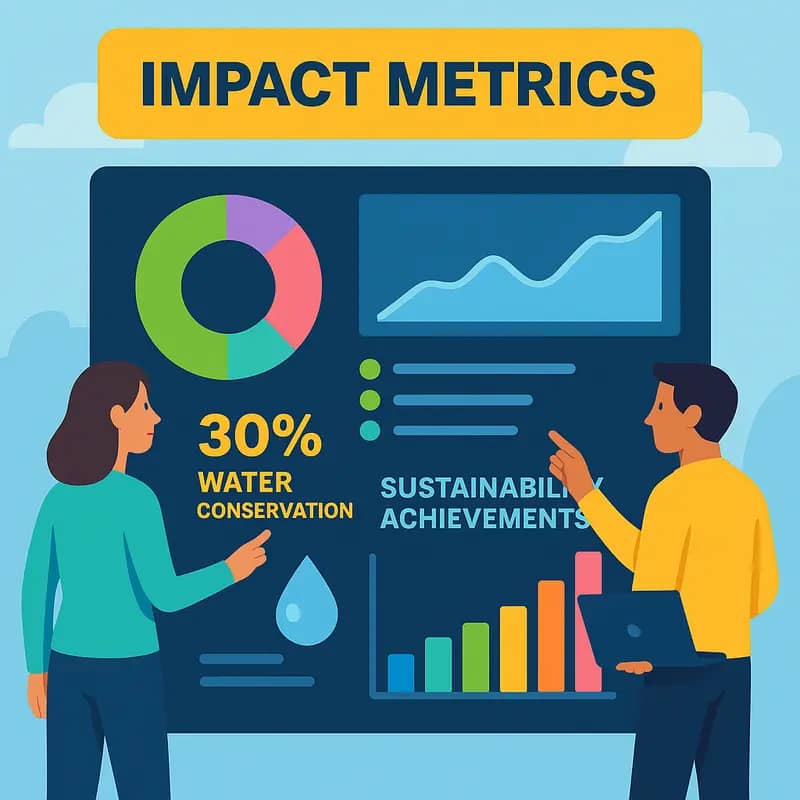
DCVC’s water technology investments demonstrate measurable environmental and social impact through rigorous performance tracking and sustainability metrics. The firm’s portfolio companies collectively save billions of gallons of water annually while significantly reducing energy consumption and operating costs.
Water conservation achievements stand out prominently among impact metrics. Through advanced leak detection, smart irrigation, and water reuse technologies, DCVC’s investments help utilities and industrial clients reduce water waste by 30-50% on average. One portfolio company alone saved over 2 billion gallons in its first two years of operation.
Energy efficiency improvements tell an equally compelling story. By implementing AI-optimized treatment processes and energy recovery systems, wastewater facilities cut power usage by up to 40%. This translates to substantial reductions in both operational expenses and carbon emissions.
The sustainability metrics extend beyond direct resource savings. DCVC’s investments in water quality monitoring and treatment have helped prevent harmful contaminant discharge, protecting both human health and aquatic ecosystems. Advanced analytics platforms enable real-time tracking of environmental compliance and early warning of potential issues.
Crucially, these impacts scale effectively across different contexts. Whether deployed in water-stressed regions or areas with aging infrastructure, the technologies consistently deliver measurable improvements in efficiency and sustainability. The economic benefits make adoption viable even in resource-constrained settings.
DCVC measures success not just in financial returns, but in the tangible environmental and social outcomes their portfolio companies achieve. By focusing on solutions that combine strong commercial potential with meaningful impact metrics, they’re demonstrating how profit and purpose can align in addressing global water challenges.
As explored in how to mitigate 4 shades of water risk through impact investing, this data-driven approach to measuring and validating impact helps ensure investments truly deliver on their sustainability promises while building resilient water systems for the future.
Future Flow

DCVC’s vision for water technology’s future centers on harnessing computational advantages and deep science to solve humanity’s most pressing water challenges. Their investment focus over the next decade will target transformative solutions at the intersection of artificial intelligence, advanced materials science, and biotechnology.
The firm sees immense potential in AI-powered smart infrastructure that can predict and prevent water system failures before they occur. Advanced machine learning algorithms will optimize treatment processes, reduce energy consumption, and enable real-time water quality monitoring at unprecedented scales.
At the materials frontier, DCVC is betting on next-generation membranes and sorbents that can selectively remove contaminants like PFAS while dramatically reducing energy requirements. These innovations leverage computational modeling to design materials at the molecular level with precisely tuned properties.
Biotechnology represents another key focus area, with investments targeting engineered microorganisms that can treat wastewater more efficiently while generating valuable byproducts. The convergence of synthetic biology and digital tools enables rapid iteration and optimization of these biological systems.
Critically, DCVC prioritizes solutions that create a computational moat – technological advantages that become stronger over time through data network effects. This could manifest through AI models that improve with more operational data or platforms that gain functionality as their user base expands.
Beyond individual technologies, DCVC envisions an integrated water management paradigm where digital twins model entire watersheds, enabling sophisticated scenario planning and real-time optimization across multiple stakeholders. This systems-level approach aims to maximize the impact of point solutions while building resilience against climate volatility.
By focusing on deep technologies with clear paths to commercialization, DCVC aims to generate both strong financial returns and measurable environmental benefits. Their thesis suggests that the most successful water innovations will be those that can scale rapidly while building persistent competitive advantages through computation and data.
Entrepreneurial Navigation
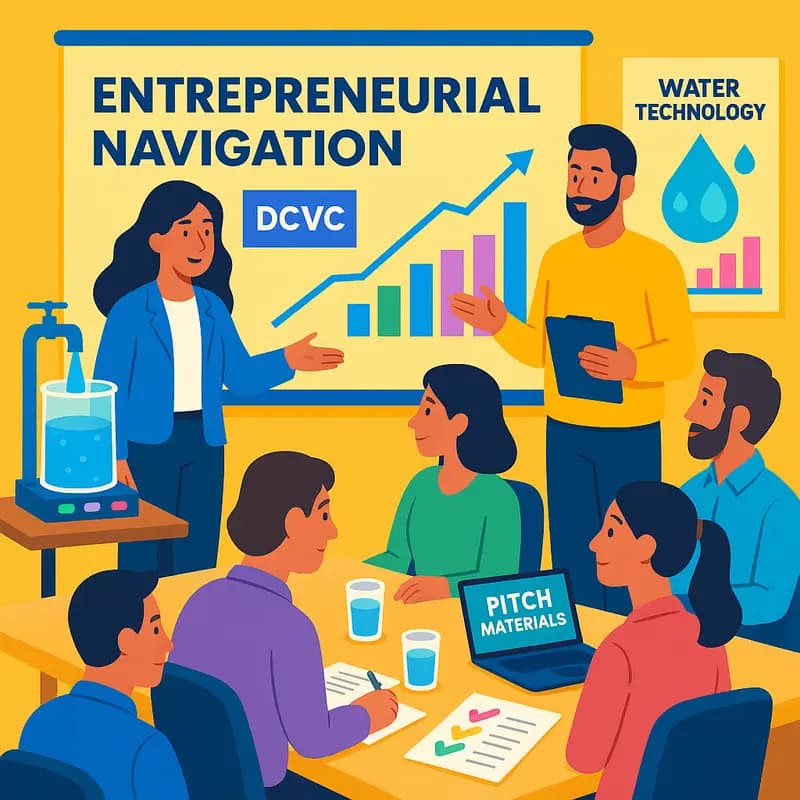
Water entrepreneurs seeking DCVC investment must demonstrate both technological excellence and commercial viability. A compelling pitch should spotlight computational advantages and deep scientific innovation while highlighting clear paths to market adoption and scalability.
The validation of water technologies requires rigorous proof across multiple dimensions. Successful entrepreneurs understand how to combine technical performance data with real-world operational metrics. This means going beyond controlled lab tests to demonstrate reliability, cost-effectiveness, and environmental benefits in representative field conditions.
DCVC places particular emphasis on solutions that leverage computational methods, whether through advanced materials science, artificial intelligence, or process optimization. Entrepreneurs should clearly articulate how their technology creates sustainable competitive advantages through computational innovation.
Strategic partnerships play a vital role in accelerating commercialization. Water startups should identify and engage potential customers, technology validators, and channel partners early in their development. These relationships provide invaluable market feedback and can significantly de-risk the path to widespread adoption.
Financial modeling must reflect a deep understanding of water market dynamics. Entrepreneurs need to demonstrate strong unit economics, realistic customer acquisition costs, and compelling long-term value creation. DCVC looks for business models that can scale efficiently while maintaining healthy margins.
Regulatory strategy and compliance pathways demand careful consideration. Successful pitches outline clear approaches to meeting water quality standards, environmental requirements, and safety regulations across target markets.
The team’s expertise should span both technical and commercial domains. DCVC values founding teams that combine deep scientific knowledge with proven business execution capabilities. Previous startup experience, while valuable, is less critical than demonstrated ability to solve complex technical challenges and build sustainable businesses.
Final words
DCVC’s approach to water technology investment represents a powerful convergence of computational innovation and environmental impact. Their portfolio demonstrates that solving water challenges requires not just technical excellence, but also a deep understanding of how advanced computation can unlock new possibilities. For entrepreneurs and investors in the water sector, DCVC’s model offers valuable lessons about the importance of combining scientific rigor with scalable business models. As water challenges continue to grow globally, DCVC’s emphasis on breakthrough technologies and computational advantages positions them at the forefront of developing solutions that could reshape our relationship with water resources. Their success stories prove that profitable ventures can align with meaningful environmental impact, creating a blueprint for future innovation in water technology.
Wanna explore the Full List of Water Investors that cut at least two checks over the past decade? Check it out and bookmark it, I update it regularly!
Learn more: https://dww.show/the-ultimate-water-investor-database/
About us
Through my “(don’t) Waste Water” platform, I offer unique and insightful coverage of the water industry that combines technical expertise with engaging storytelling. If you haven’t yet, it might be time for you to subscribe to the podcast, the youtube channel and/or the newsletter!
